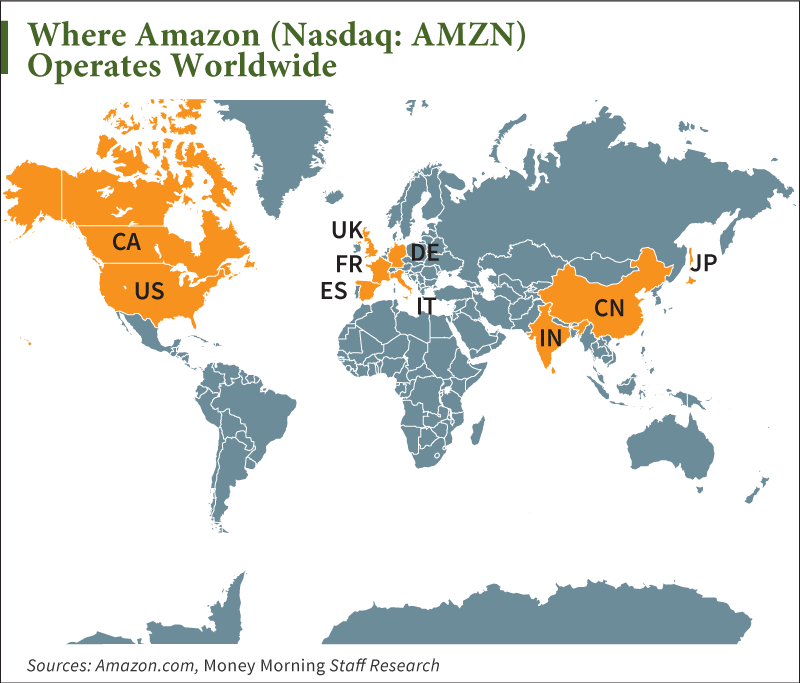Amazon.com Inc. (Nasdaq: AMZN), the world's biggest online retailer, announced Wednesday a deal to place a new Amazon HQ in China's Shanghai Pilot Free Trade Zone (SFTZ) late next month.
Implemented in September 2013, the SFTZ is the first-ever free trade zone in mainland China. It provides preferential treatment to foreign investors via relaxed import and export policies, and looser financial requirements compared to the rest of the country.
 |
| Click to Enlarge |
This contrasts the stringent, prohibitive rules otherwise in place in the country. Historically, China's policy has been to encourage national brands over foreign ones, making it very difficult for outsiders to provide access to, market, and deliver their products there. For instance, since 2000, gaming consoles like Microsoft's Xbox have been banned for sale in China. But now, their sale is permitted within the SFTZ.
The new Amazon HQ will allow the world's largest online retailer to sell products from all over the world in China. Additionally, China will have a new platform to sell its products internationally. A new logistics warehouse will allow Amazon to export goods from localized producers.
According to Want China Times, Chinese buyers will be able to shop on Amazon's website designed for the local market. It will feature Chinese-language directions and prices in renminbi (yuan), or alternatively, customers can shop Amazon products via Kuajingtong.com - the cross-border e-commerce platform that the SFTZ launched in December that has the Chinese government's backing.
But AMZN - a company that seems to want to gain market share in every profitable nook and cranny - clearly has another aim besides widening its moat geographically...
New Amazon HQ Sets the Stage for a Turf War with Alibaba
A new Amazon HQ in China will allow the company to take on Chinese e-commerce giant Alibaba (NYSE: BABA) on its home turf.
Alibaba will be doing something similar beginning Sept. 16, when its stock is expected to debut in U.S. markets in what could be the biggest IPO in history. (You can get the full story on the Alibaba IPO here.)
In the highly-regulated Chinese market, Alibaba gained foothold as an early seller of international brands. Through its e-commerce platforms Tmall and Taobao, Alibaba currently dominates 80% of online retail market share in China, and accounts for 60% of parcel deliveries there. In 2012, the company handled 1.1 trillion yuan in sales ($170 billion) - more than AMZN and eBay did that year combined. In the first quarter of 2013, Tmall accounted for 51.3% of all Chinese business-to-consumer online product sales. And Alibaba's online payment service "Alipay" makes up about half of all online payment transactions in China.
It's an understatement to say that Amazon faces stiff competition for online retail market share in China. Still, Amazon is calling the move an "incredible opportunity"...
"I look forward to working with our Shanghai partners to realize the incredible opportunity of developing the best cross-border shopping experience possible for not only customers in China but also around the world and establishing Shanghai as a recognized international cross-border e-commerce centre," AMZN senior vice president of international consumer business Diego Piacentini said Wednesday.
Money Morning Defense & Tech Specialist Michael A. Robinson has long been a fan of Amazon's resourcefulness and product growth, and the deal for a new Amazon HQ in China is a prime example.
"These guys leave no stones unturned for the next dollar they can bring in," Robinson said earlier this year. "Amazon is constantly upselling, cross-selling, and looking for new products, and they're great at it. Once this franchise is built out, there are billions of dollars in cash flow that will fall to the bottom line."
Can Amazon compete with Alibaba on BABA's home turf? Leave us a comment on Money Morning's Facebook page. Also, you can join us on Twitter by following @moneymorning.
GoPro Inc. (Nasdaq: GPRO) stock has gained 40% since the company's IPO launched on June 26. As an individual investor, you probably couldn't participate in the GoPro IPO (or any IPO). However, that's a good thing; the best way to play GoPro isn't the company's stock. Instead, you can get the most gains by buying the little-known firms that act as suppliers for the big boys. And this supplier provides a way to profit from GPRO indirectly - it's got vanguard technology and a robust presence in wearables...
Related Articles:


